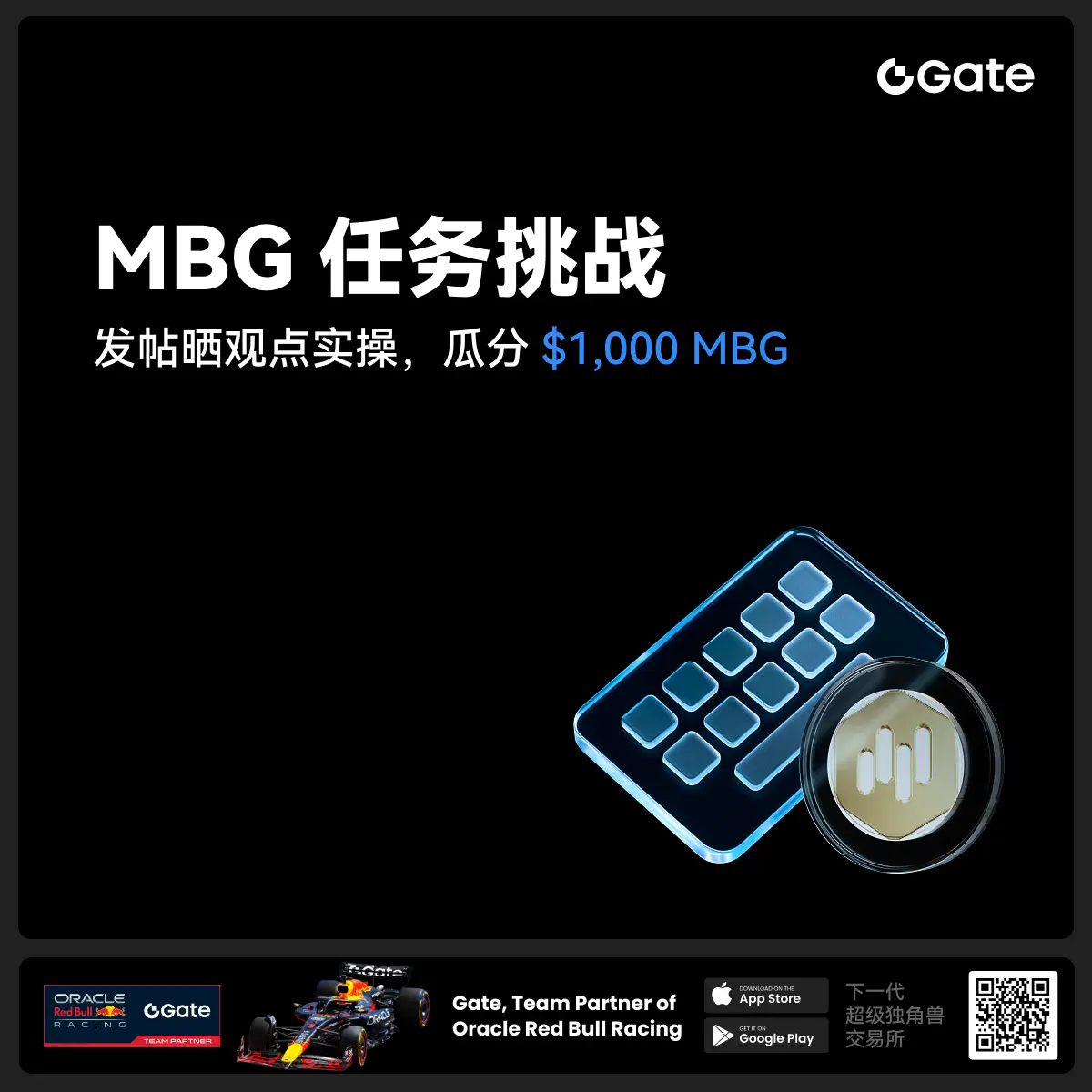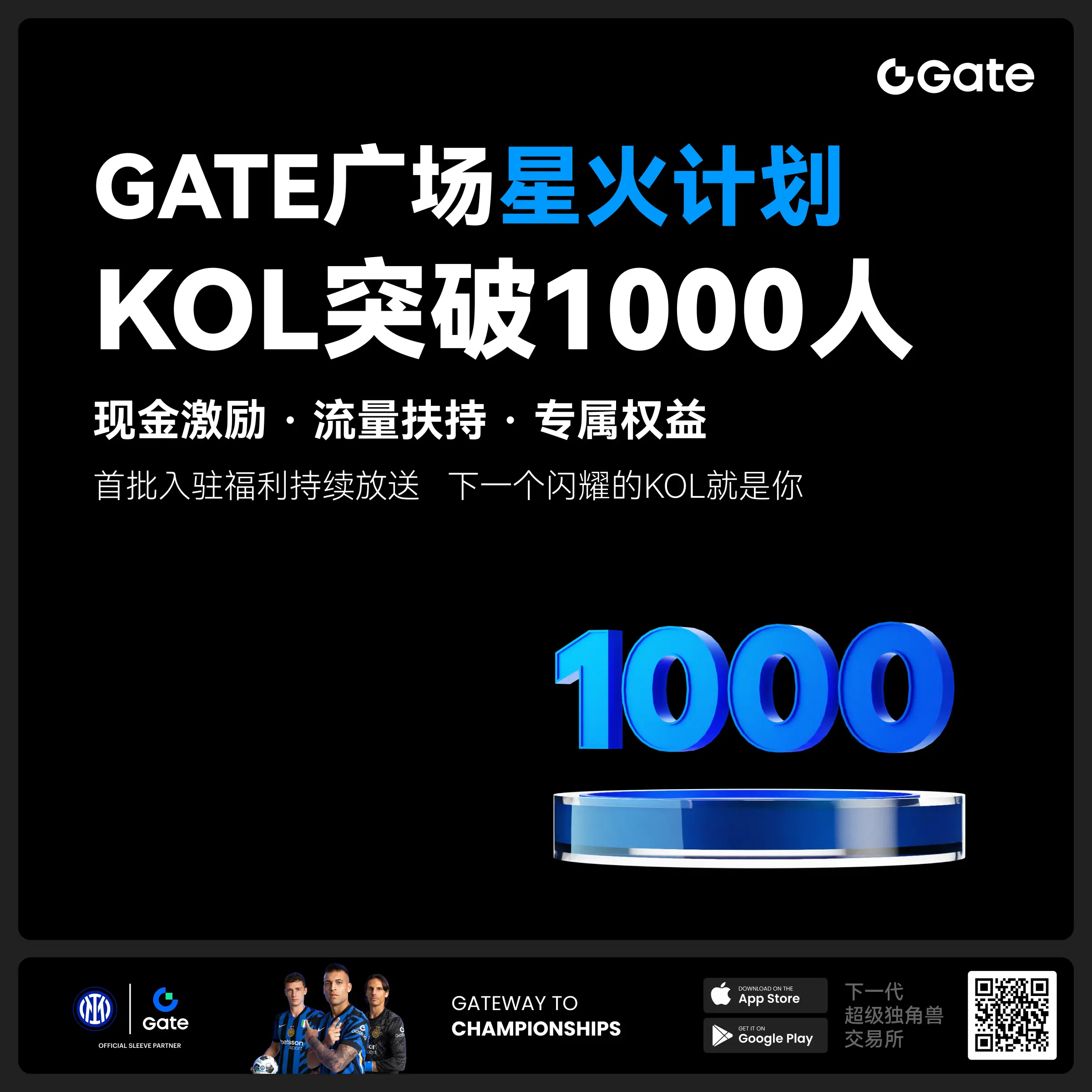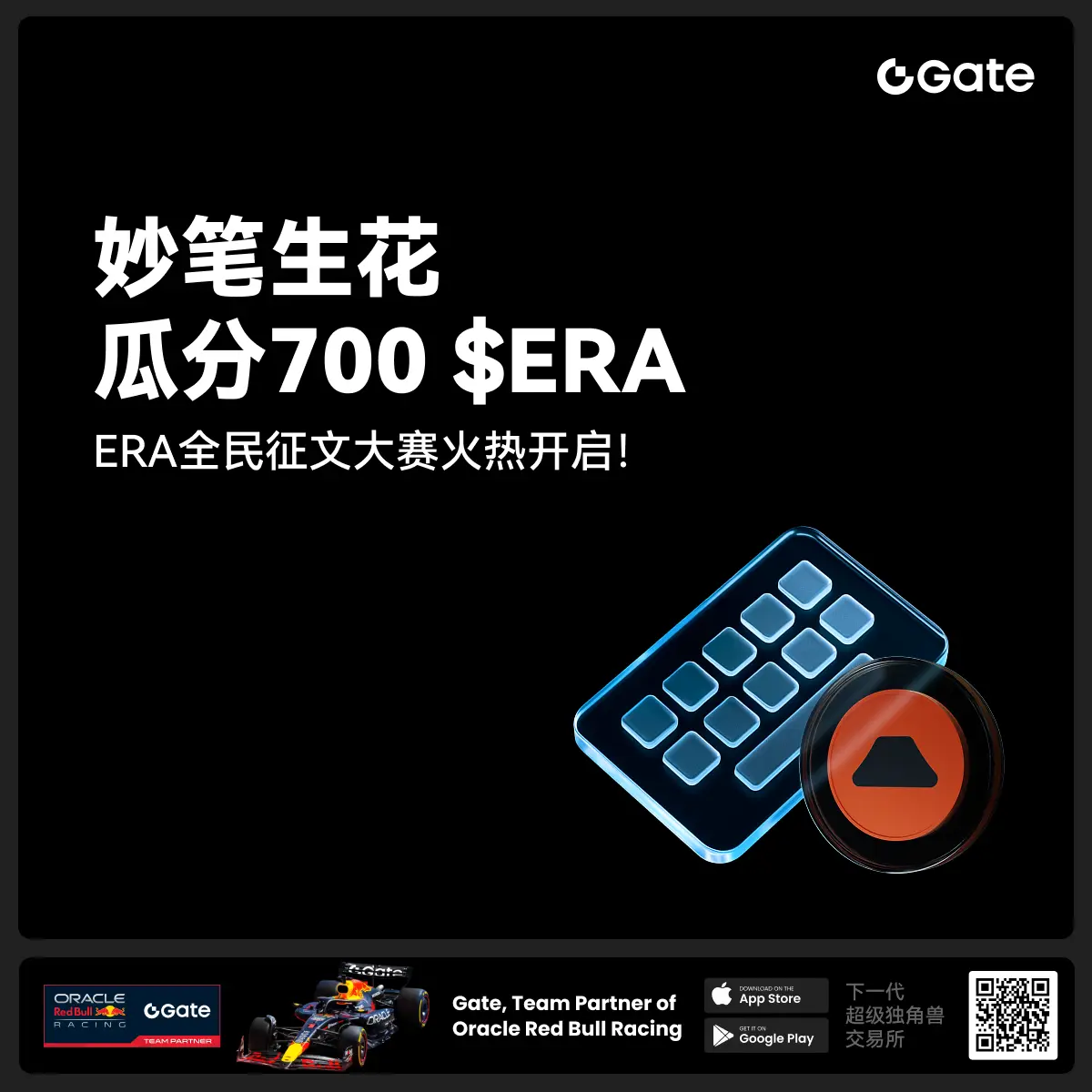- 话题1/3
17934 热度
26649 热度
21224 热度
52548 热度
19950 热度
- 置顶
- 📢 Gate广场 #MBG任务挑战# 发帖赢大奖活动火热开启!
想要瓜分1,000枚MBG?现在就来参与,展示你的洞察与实操,成为MBG推广达人!
💰️ 本期将评选出20位优质发帖用户,每人可轻松获得50枚MBG!
如何参与:
1️⃣ 调研MBG项目
对MBG的基本面、社区治理、发展目标、代币经济模型等方面进行研究,分享你对项目的深度研究。
2️⃣ 参与并分享真实体验
参与MBG相关活动(包括CandyDrop、Launchpool或现货交易),并晒出你的参与截图、收益图或实用教程。可以是收益展示、简明易懂的新手攻略、小窍门,也可以是现货行情点位分析,内容详实优先。
3️⃣ 鼓励带新互动
如果你的帖子吸引到他人参与活动,或者有好友评论“已参与/已交易”,将大幅提升你的获奖概率!
MBG热门活动(帖文需附下列活动链接):
Gate第287期Launchpool:MBG — 质押ETH、MBG即可免费瓜分112,500 MBG,每小时领取奖励!参与攻略见公告:https://www.gate.com/announcements/article/46230
Gate CandyDrop第55期:CandyDrop x MBG — 通过首次交易、交易MBG、邀请好友注册交易即可分187,500 MBG!参与攻略见公告:https://www.gate.com/announcements
- 🎉 Gate广场“星火计划”入驻KOL突破1000人!
💥 创作者生态迎来全面爆发期!
📈 上首页、拿奖励、赢影响力,你还在等什么?
💰 现金激励 ✔️
🚀 流量扶持 ✔️
👑 专属认证 ✔️
从0到1000,我们只用了短短数周,Gate广场正在成为Web3内容风暴眼⚡
你发布的不只是内容,而是下一个“爆款机会”!
🌟 加入星火计划,开启你的爆发之路!
👉 https://www.gate.com/announcements/article/45695
#GateSquare # #星火计划# #内容创作者新纪元 # #KOL集结令#
- 📢 #Gate广场征文活动第三期# 正式启动!
🎮 本期聚焦:Yooldo Games (ESPORTS)
✍️ 分享独特见解 + 参与互动推广,若同步参与 Gate 第 286 期 Launchpool、CandyDrop 或 Alpha 活动,即可获得任意奖励资格!
💡 内容创作 + 空投参与 = 双重加分,大奖候选人就是你!
💰总奖池:4,464 枚 $ESPORTS
🏆 一等奖(1名):964 枚
🥈 二等奖(5名):每人 400 枚
🥉 三等奖(10名):每人 150 枚
🚀 参与方式:
在 Gate广场发布不少于 300 字的原创文章
添加标签: #Gate广场征文活动第三期#
每篇文章需 ≥3 个互动(点赞 / 评论 / 转发)
发布参与 Launchpool / CandyDrop / Alpha 任一活动的截图,作为获奖资格凭证
同步转发至 X(推特)可增加获奖概率,标签:#GateSquare 👉 https://www.gate.com/questionnaire/6907
🎯 双倍奖励机会:参与第 286 期 Launchpool!
质押 BTC 或 ESPORTS,瓜分 803,571 枚 $ESPORTS,每小时发放
时间:7 月 21 日 20:00 – 7 月 25 日 20:00(UTC+8)
🧠 写作方向建议:
Yooldo
- 🎉Gate 2025 上半年社区盛典:内容达人评选投票火热进行中 🎉
🏆 谁将成为前十位 #Gate广场# 内容达人?
投票现已开启,选出你的心头好
🎁赢取 iPhone 16 Pro Max、限量周边等好礼!
📅投票截止:8 月 15 日 10:00(UTC+8)
立即投票: https://www.gate.com/activities/community-vote
活动详情: https://www.gate.com/announcements/article/45974
- 📢 #Gate广场征文活动第二期# 正式启动!
分享你对 $ERA 项目的独特观点,推广ERA上线活动, 700 $ERA 等你来赢!
💰 奖励:
一等奖(1名): 100枚 $ERA
二等奖(5名): 每人 60 枚 $ERA
三等奖(10名): 每人 30 枚 $ERA
👉 参与方式:
1.在 Gate广场发布你对 ERA 项目的独到见解贴文
2.在贴文中添加标签: #Gate广场征文活动第二期# ,贴文字数不低于300字
3.将你的文章或观点同步到X,加上标签:Gate Square 和 ERA
4.征文内容涵盖但不限于以下创作方向:
ERA 项目亮点:作为区块链基础设施公司,ERA 拥有哪些核心优势?
ERA 代币经济模型:如何保障代币的长期价值及生态可持续发展?
参与并推广 Gate x Caldera (ERA) 生态周活动。点击查看活动详情:https://www.gate.com/announcements/article/46169。
欢迎围绕上述主题,或从其他独特视角提出您的见解与建议。
⚠️ 活动要求:
原创内容,至少 300 字, 重复或抄袭内容将被淘汰。
不得使用 #Gate广场征文活动第二期# 和 #ERA# 以外的任何标签。
每篇文章必须获得 至少3个互动,否则无法获得奖励
鼓励图文并茂、深度分析,观点独到。
⏰ 活动时间:2025年7月20日 17
台大高材生林睿庠暗网贩毒月收 1.6 亿台币,「隐身市场」主脑咬共犯换美国减刑
他曾是台湾大学资讯管理系的资优学生,却选择走上暗网贩毒的不归路。年仅 20 多岁的林睿庠,利用加密技术与虚拟货币打造全球最大毒品交易平台之一「Incognito Market(隐身市场)」,从中赚取超过 1 亿美元的不法财富。如今,这位原本以为能隐身于数位世界的毒枭,不仅遭美国 FBI 破获,还传出将与美方合作,咬出尚未曝光的共犯以求减刑,震惊社会。
(经营暗网毒品交易平台获利百万美元!23 岁台外交替代役男已认罪,恐判终身监禁)
美国 FBI 破获隐身市场 主嫌竟是台大高材生
「隐身市场」是一个专门在暗网上贩售毒品的平台,运作长达三年,业绩最高峰时月营收高达 500 万美元(约新台币 1.6 亿元),吸引来自世界各地的毒贩与买家。根据美国司法部资料,这个平台是由一名代号「Pharoah(法老)」的人主导经营,而他真实身份正是来自台湾的林睿庠。
林睿庠透过精密的加密技术设计出完善的匿踪交易机制,平台上可买卖的大麻、安非他命、迷幻药等毒品五花八门,并完全使用虚拟货币结帐,不仅难以追查,还能跨国进行贩运,甚至出现台湾毒虫透过比特币从欧洲邮购大麻种子的案例。
台湾查扣资产逾 2 亿 林男传与美方合作求减刑
美方逮捕林睿庠后,台湾检警展开资产追查行动,至今已查扣超过新台币 2 亿元,包括其名下的豪宅、银行帐户与加密货币资产。据《镜周刊》报导,林男近期与美国检方达成合作协议,愿意供出尚未曝光的共犯,条件是避免被判处终身监禁。
为此,美国纽约法院罕见决定延后原定的判刑日期至今年 9 月,只要美方能顺利逮捕林所供出的其他共犯,他未来可能面临的刑期将大幅减轻。
毒品市场新挑战:虚拟货币成毒贩新宠
「隐身市场」的成功,暴露出全球打击毒品犯罪的新难题。虚拟货币因其匿名性、去中心化与难以追踪等特性,成为现代毒贩最爱使用的交易工具。调查局在上月的一场反毒研讨会中,特别以林睿庠案件为例,深入分析虚拟货币查扣与追缉的实务难题。
据悉,高雄已有毒品使用者透过比特币从荷兰、西班牙订购大麻种子寄回台湾,类似案例频传,让执法机关疲于奔命。
家世背景曝光:单亲成长、兄弟考上台大靠奖学金度日
虽然林睿庠如今成为全球关注的毒品案主角,但他的家庭背景也让人唏嘘。他的父母早年离异,父亲为台大杰出校友、科技界知名人士,但林自幼由母亲独自抚养,家庭经济拮据。他与弟弟努力求学,靠奖学金与书卷奖维持生活,双双考上台大。
林曾向调查人员透露,为了体恤母亲辛苦,他曾经长期吃饭团度日,只想让妈妈过上好日子。他的母亲则为了孩子,即使饿肚子也坚持送兄弟俩上私立学校,这段单亲妈妈栽培高材生的故事原是感人,如今却成为犯罪案件的注脚。
狱中家书曝光:认错但未承认贩毒 盼早日回家
林睿庠在美国落网后,从监狱写了一封家书寄回台湾。他在信中坦言自己「抄了捷径,走错了路」,但并未明确承认贩毒。他声称并未在台湾贩毒,无意伤害国家,只是一心想让家人过上更好的生活。
信中,他提醒母亲要记得吃药看病,并对弟弟说:「你该醒来了,不要再像个孩子。」他表示自己愿意扛下过去的责任,期待有一天能平安回家。
加密时代的新型毒品犯罪,社会该如何应对?
林睿庠的案件不只是一起高科技毒品犯罪,更揭示出虚拟货币与加密技术正如何被滥用于全球跨境毒品交易。从一个获奖无数的资优生,到成为全球毒品网路平台的经营者,这条路的代价沉重,也对各国司法与科技监管提出新挑战。未来,政府与执法单位如何提升科技侦查能力,追踪加密交易背后的非法活动,将成为打击数位时代毒品犯罪的关键。
这篇文章 台大高材生林睿庠暗网贩毒月收 1.6 亿台币,「隐身市场」主脑咬共犯换美国减刑 最早出现于 链新闻 ABMedia。